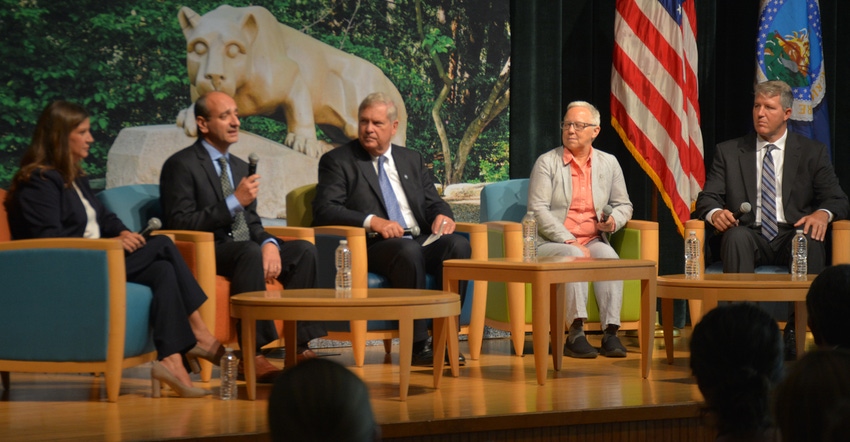
In his announcement of the first round of funding under the Biden administration’s Partnerships for Climate-Smart Commodities on Wednesday at Penn State, U.S. Secretary of Agriculture Tom Vilsack said that 17 of the 70 projects approved for funding would at least have a partial impact in Pennsylvania — with many other Northeast and mid-Atlantic states also involved in projects.
In all, Vilsack said the program would touch 50,000 farmers working 20 million acres across the country — the goal being that the department, through funding these projects, will be able to quantify and measure as much as 50 million metric tons of equivalent carbon dioxide being reduced or eliminated from farms.
"It’s a tremendous opportunity to establish best practices; it's a tremendous opportunity to lead the way toward climate-smart commodities, to lead the way toward developing climate-smart markets for that higher-value proposition for farmers," Vilsack said.
So, what projects are being funded, and what impact will they have in the Northeast and mid-Atlantic? Here are some examples:
Dairy. Armen R. Kemanian, professor of production systems and modeling in the College of Agricultural Sciences at Penn State, is leading a project called “Climate-Smart Agriculture that is Profitable, Regenerative, Actionable and Trustworthy,” or CARAT.
The project got $25 million from USDA and, according to the official description, will work with dairy farmers to put in practices to lessen methane and nitrous oxide emissions, and expand markets for products using these practices.
Other partners include the Center for Dairy Excellence, Professional Dairy Managers of Pennsylvania, Proagrica and Red Barn Consulting.
Dairy Farmers of America got $45 million for a project to connect on-farm greenhouse gas reductions to the growing market for low-carbon dairy products. Most of the states involved in this project are in the Northeast — including all the New England states, Maryland, New Jersey, New York and Pennsylvania.
A $25 million project led by The Conservation Innovation Fund will target hundreds of dairy farms in Pennsylvania, Maryland and Virginia to put in climate-smart practices, as well as develop whole-farm plans around these practices. Maryland & Virginia Milk Producers Cooperative, South Mountain Creamery, Stroud Water Research Center, and Alliance for the Chesapeake Bay are among the partners.
And Maple Hill Creamery in New York got $20 million to incentivize implementation and provide training for farmers to put in climate-smart practices on the farm.
Other commodities. Pasa Sustainable Agriculture got $55 million from USDA for its “Climate-Smart Farming and Marketing: Engaging in Community Science” project.
Hannah Smith-Brubaker, executive director of Pasa Sustainable Agriculture, said the initial focus will be enrolling more farmers in the organization’s soil health benchmark study and giving them an easier way to share data among themselves and even with consumers.
The project will also gather data on consumer demand for foods produced using climate-smart practices, as well as developing a food-shed map to make it easy for customers to buy foods from farms using these practices.
"Many of our farmers have a practice or two installed,” Smith-Brubaker said. “Through presurvey, we realized that a lot of these farmers want to install many more conservation practices; they just need the technical support and funding. And so we are just thrilled with this opportunity because I really think it's going to jump-start that for these farmers.”
Pasa is working with 20 other farming and agroforestry organizations on the project, which spans most of the Northeast and mid-Atlantic.
The largest award, $95 million, went to the National Fish & Wildlife Foundation for a project to accelerate long-term cover crop adoption by creating a platform to incentivize farmers. The platform, according to the official description, will quantify, verify and facilitate the sale of ecosystem benefits and create a marketplace to generate demand for climate-smart commodities. Farmers in Maryland, Delaware, New York and Pennsylvania will be included.
The DeLong Co. got $40 million for a project to measure farming practices that reduce greenhouse gases. as well as brand and develop a market for climate-market commodities. Farms in New Jersey, New York, Michigan, Ohio and Pennsylvania are included.
And the New England Forestry Foundation got $30 million to implement forest management practices to store more carbon in the forest and build markets for climate-smart forest products.
Interested in learning more? Contact any of the organizations listed below to see how you can be involved in a project:
Pasa Sustainable Agriculture: pasafarming.org
The DeLong Co.: delongcompany.com
Maple Hill Creamery: maplehill.com
Conservation Innovation Fund: conservationinnovationfund.org
Dairy Farmers of America: dfamilk.com
About the Author(s)
You May Also Like






